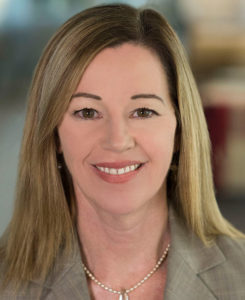The intersection between tax policy and social policy is dicey for some tax professionals, but it’s what Barbara Young finds most interesting. “Although tax policy clearly has economic consequences in terms of tax revenue, it is often used as a tool to address social or societal issues. These two aspects are not always compatible in terms of outcomes and can have unintended consequences,” she explains.

Young, the vice president of global tax reporting and compliance at Marriott International Inc., began her career as an auditor at a public accounting firm. “At that time, the U.S. Tax Code had just been completely overhauled, and I was also working with clients as they wrestled with a slew of new tax issues. To me, the tax side was much more interesting than audit,” she says.
She realized that to build up her tax knowledge, she needed to go back to school. “Fortunately, I was accepted to law school at Georgetown University Law Center, which also had a Tax LLM program,” she notes. Young’s journey in the tax field began in earnest.
After law school, Young joined Arthur Andersen in its national tax office, focusing on assisting clients with federal income tax rulings and issues. She joined Ernst & Young several years later and was a tax partner there until 2006, when she made the leap to her first in-house position. That company was acquired, and Young next joined a small satellite company to help it prepare for an initial public offering, finally landing at Marriott in 2010 “to focus on creating a first-class global tax reporting and compliance function.”
A Satellite Company and Taxation
While assisting the satellite company, Young faced some intriguing issues: “The tax [permanent establishment] and nexus issues related to satellites are fascinating, because these objects orbit over a state or country and those jurisdictions want to find a way to tax the satellite owner. California, for example, tried to impose property taxes on each satellite that passed over the state, calling them ‘movable property.’ India and other countries try to impose tax based on the satellite transmissions. It’s fascinating to watch how these tax authorities twist and bend archaic statutes.”
Young has found at least one big surprise in the tax field: the drafters of tax statutes, regulations, and rules typically give little consideration to how the new rule will operate in practice or what challenges its implementation will create. “The disconnection is particularly challenging in the large business environment, where a new rule often requires changes to the accounting or financial reporting systems that are complicated, costly, and time-consuming,” Young explains.
Academic Pursuits
Young spent a couple of semesters as an adjunct professor of tax accounting in the Tax LLM program at Georgetown Law. “Many students had never taken an accounting course before. If they were to succeed, I had to find a way to help them understand the basic accounting concepts. That was quite a challenge!” she says.
Young is a huge TEI fan, noting that the organization provides tremendous opportunities to network with really smart tax professionals who often have similar issues and challenges. In addition, she says TEI also helps positively influence tax and accounting policy through the collective voice of the in-house tax executive group. “I recently participated in two TEI projects to draft comment letters to the Financial Accounting Standards Board on proposed changes for tax reporting, and those experiences were very gratifying,” Young notes.
Attracting Millennials
As an Emerging Leader, Young pays attention to attracting millennials to TEI. “That’s been a big focus of our local chapter of TEI. We created a mailing list of nonmembers, and we invite them to our events to engage them with TEI as often as possible. I think it’s critical for TEI to find a way to engage with the current generation of younger in-house tax professionals that are the pipeline for the next generation of tax executives,” she says. “I know TEI, through its Emerging Tax Professionals initiative, is developing new ways to meaningfully engage with these professionals and to share why TEI should be a key component in their professional development. I applaud and endorse those efforts.”
When she’s not knee-deep in tax, Young loves to travel. (“I’m so glad I work for Marriott!”) She loves the Caribbean, “where I can indulge in my true passions—scuba diving and underwater photography. Floating under the sea is absolutely the best place to get away from email and the phone. It’s so quiet and amazing to see beautiful fish and coral,” she says.
You can sometimes find Young on the links. “My first golf game was at Pebble Beach. The weather was perfect, and I spent a lot of time taking pictures,” she says.



